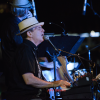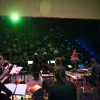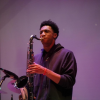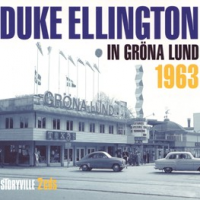Home » Jazz Musicians » Duke Ellington
Duke Ellington
By the time of his passing, he was considered amongst the world’s greatestcomposers and musicians. The French government honored him with theirhighest award, the Legion of Honor, while the government of the UnitedStates bestowed upon him the highest civil honor, the Presidential Medal ofFreedom. He played for the royalty and for the common people and by theend of his 50-year career, he had played over 20,000 performancesworldwide. He was The Duke, Duke Ellington.
Edward Kennedy Ellington was born into the world on April 29, 1899 inWashington, D.C. Duke’s parents, Daisy Kennedy Ellington and James EdwardEllington, served as ideal role models for young Duke, and taught himeverything from proper table manners to an understanding of the emotionalpower of music. Duke’s first piano lessons came around the age of seven oreight and appeared not to have had that much lasting effect upon him. Itseemed as if young Duke was more inclined to baseball at a young age.
Duke got his first job selling peanuts at Washington Senator’s baseballgames. This was the first time Duke was placed as a "performer" for a crowdand had to first get over his stage fright. At the age of 14, Duke begansneaking into Frank Holliday’s poolroom. His experiences from the poolroomtaught him to appreciate the value in mixing with a wide range of people.
As Duke’s piano lessons faded into the past, Duke began to show a flare forthe artistic. Duke attended Armstrong Manual Training School to studycommercial art instead of going to an academics-oriented school. Dukebegan to seek out and listen to ragtime pianists in Washington and, duringthe summers, in Philadelphia or Atlantic City, where he and his mothervacationed .
While vacationing in Asbury Park, Duke heard of a hot pianist named HarveyBrooks. At the end of his vacation, Duke sought Harvey out in Philadelphiawhere Harvey showed Duke some pianistic tricks and shortcuts. Duke laterrecounted that, "When I got home I had a real yearning to play. I hadn’t beenable to get off the ground before, but after hearing him I said to myself, ‘Manyou’re going to have to do it.’" Thus the music career of Duke Ellington wasborn.
Duke was taken under the wings of Oliver "Doc" Perry and Louis Brown, whotaught Duke how to read music and helped improve his overall piano playingskills. Duke found piano playing jobs at clubs and cafes throughout theWashington area. Three months shy of graduation, Duke dropped out ofschool and began his professional music career.
Read moreTags
The Duke Ellington Carnegie Hall Concerts: January 1943

by Chuck Lenatti
Duke Ellington was one of the most popular and successful jazz musicians of the first half of the 20th century and according to composer Gunther Schuller and musicologist and historian Barry Kernfeld, “the most significant composer of the genre." Radio broadcasts from his residency at New York's Cotton Club beginning in 1927 extended Ellington's orchestra's national exposure and a parade of hit records, from “East St. Louis Toodle-Oo" in 1926 to “C Jam Blues" in 1942, among many ...
Continue ReadingDuke Ellington: Copenhagen 1958

by Ken Dryden
Duke Ellington left a formidable discography at his death at the age of 75 in 1974, and it has expanded greatly with the number of concerts that have been uncovered and issued since then. This CD is drawn from two 1958 concerts at KB Hallen in Copenhagen, though they are not sourced from the original, long lost broadcast tapes, but dubs evidently made by a fan. What makes this a valuable find is that the band is in top form ...
Continue ReadingDuke Ellington: Duke Ellington Copenhagen 1958 (Bonus: After Hours 1950)

by Jack Kenny
Duke Ellington hated flying so, in 1958, Ellington and Co sailed into Southampton UK to prepare for a tour of Europe. Before going on to Copenhagen, Ellington completed a tour of the UK, taking in Leeds where he met Queen Elizabeth, an event which eventually resulted in the “Queen's Suite." Earlier in the year, his strange obsession with royalty had produced a piece for Princess Margaret, “Princess Blue'" The band was particularly strong in this part of its ...
Continue ReadingDuke Ellington: Isfahan

by Ian Patterson
Part of Duke Ellington's Far East Suite (1967), “Isfahan" took its inspiration from a visit to the city of Isfahan, Iran, in 1963. Of the ancient city Ellington wrote: “everything is poetry," a sentiment transferred beautifully to this most moving of Strayhorn/Ellington compositions. Curious too, to see Ellington holding the sheet music for soloist Johnny Hodges. The same tour also took the Duke Ellington Orchestra to Syria, Palestine, Iraq, Afghanistan and Lebanon, among other stops. Will such an itinerary ever ...
Continue ReadingDuke Ellington's Top Ten Albums

by DIG 9000
Duke Ellington, the legendary jazz composer, pianist, and bandleader, released numerous albums throughout his illustrious career. It's challenging to narrow down his extensive discography to just ten, but here are some essential Duke Ellington albums that showcase his incredible talent and contribution to jazz: Ellington at Newport Columbia Records 1956 This live album is one of Ellington's most famous and significant recordings, featuring the iconic performance of “Diminuendo and Crescendo in Blue" with an ...
Continue ReadingJazz Lines: Free Verse In The Key Of Jazz

by Gloria Krolak
Duke Ellington, composer, arranger, pianist and originator of big-band jazz, wrote “Sweet Jazz O'Mine" in 1930 when the genre was blooming. As a bandleader, Ellington was unsurpassed. He chose his musicians wisely and inspired some of their best work. “Sweet Jazz" is a lively foxtrot celebrating this unorthodox new style that had people dancing and feeling good. What became my poem is a collection of songs about the instruments that make up the whole, the drums, the trombone, the clarinet, ...
Continue ReadingFrom Chart to Reality: The Editorial Role of the Pianist in a Big Band

by Kurt Ellenberger
Note: This article was first published in the Jazz Education Journal in 2005, and was revised for All About Jazz. Preamble This article was written to address an issue that needed clarification, and indeed still needs clarification almost 20 years later, regarding the vagaries inherent in many of the published big band piano charts in use at hundreds of colleges and high schools. The professional jazz pianist will treat the written part with a great deal of freedom, ...
Continue ReadingDuke Ellington at Grinnell College, 1957

Source:
JazzWax by Marc Myers
On January 10, 1957, during a snowy Thursday evening, the Duke Ellington Orchestra played a concert at Grinnell College in Grinnell, Iowa. The performance was taped by the school with sophisticated gear, and the subsequent LP was released in limited supply. As a result, it has always been a highly sought-after album. Last week, Carl Woideck emailed with news that all the tracks were up on YouTube. Which is great to hear, since copies of vinyl copies very hard to ...
read more
Jazz Musician of the Day: Duke Ellington

Source:
Michael Ricci
All About Jazz is celebrating Duke Ellington's birthday today!
By the time of his passing, he was considered amongst the world’s greatest composers and musicians. The French government honored him with their highest award, the Legion of Honor, while the government of the United States bestowed upon him the highest civil honor, the Presidential Medal of Freedom. He played for the royalty and for the common people and by the end of his 50-year career, he had played over 20,000 ...
read more
Count, Duke, Stan, Harry, Gerald and Tubby in '65

Source:
JazzWax by Marc Myers
Thought to be over and done in 1965, big bands staged a comeback. Most of their acclaim came on tours in Europe and and on TV, but the truth is that bands led by top names were undergoing a renaissance. With their kids in college or out of the house and rock starting to dominate, many older listeners in the U.S. began paying attention again to artists who had shaped their youth. Abroad, a generation of young adults marveled at ...
read more
Jazz Musician of the Day: Duke Ellington

Source:
Michael Ricci
All About Jazz is celebrating Duke Ellington's birthday today!
By the time of his passing, he was considered amongst the world’s greatest composers and musicians. The French government honored him with their highest award, the Legion of Honor, while the government of the United States bestowed upon him the highest civil honor, the Presidential Medal of Freedom. He played for the royalty and for the common people and by the end of his 50-year career, he had played over 20,000 ...
read more
Duke Ellington: Berlin 1959

Source:
JazzWax by Marc Myers
After my post last week on 16 jazz geniuses, I predictably received a flood of emails asking why Duke Ellington was missing from my list. As I explained, while Duke was exceptional, his piano didn't change the direction of jazz nor did a school emerge that emulated his approach. But the emails did give me pause. Perhaps Duke's influence was more subliminal, I thought. That's when it came to me. Ellington's genius was beauty and greater artistic self-worth. Prior to ...
read more
Jazz Musician of the Day: Duke Ellington

Source:
Michael Ricci
All About Jazz is celebrating Duke Ellington's birthday today!
By the time of his passing, he was considered amongst the world’s greatest composers and musicians. The French government honored him with their highest award, the Legion of Honor, while the government of the United States bestowed upon him the highest civil honor, the Presidential Medal of Freedom. He played for the royalty and for the common people and by the end of his 50-year career, he had played over 20,000 ...
read more
Videos: Three Ellington Reeds

Source:
JazzWax by Marc Myers
Duke Ellington was a tonal impressionist. Each musician in his band had two functions—to be able to play and to have a special sound. Taken as a whole, his orchestral pieces were like canvases, with different hues layered on top of each other. Here are three of Ellington's top saxophonists on solo showcases, providing an opportunity to hear their distinct sounds isolated: Here's Ben Webster on Chelsea Bridge... Here's Harry Carney on Sophisticated Lady... And here's Johnny Hodges on I ...
read more
Jazz Musician of the Day: Duke Ellington

Source:
Michael Ricci
All About Jazz is celebrating Duke Ellington's birthday today!
By the time of his passing, he was considered amongst the world’s greatest composers and musicians. The French government honored him with their highest award, the Legion of Honor, while the government of the United States bestowed upon him the highest civil honor, the Presidential Medal of Freedom. He played for the royalty and for the common people and by the end of his 50-year career, he had played over 20,000 ...
read more
New Duke Ellington Videos

Source:
JazzWax by Marc Myers
Yesterday, I was craving Duke. You know how it is. You find yourself in the mood for Ellington's earthy compositions, elegant arrangements, crisp horns, mournful trombones and mink-like reeds, and you have to hear it. So you listen to his Blanton-Webster band of the early 1940s and the Gonsalves-Terry band of the early '50s and beyond, and suddenly you feel alive in a different way. A day of Ellington inspired me to share five recently posted YouTube clips of the ...
read more
Five Videos: Duke Ellington

Source:
JazzWax by Marc Myers
The rise of swing and jazz's sophisticated elegance starts with Duke Ellington. His first recordings were with Wilbur Sweatman and His Acme Syncopators in August 1924. His first leadership 78 was recorded in November of that year, billed as the Washingtonians. His first Columbia recording came in March 1927, with East St. Louis Toodle-oo, Hop Head and Down in Our Alle Blues. From there, he would go on to compose beautiful jazz songs and change the direction of the music, ...
read more

 The Jazz legend, Ellington become the first blackAmerican to be prominently featured on a U.S. coin in circulation with therelease of a quarter honoring the District of Columbia.
The Jazz legend, Ellington become the first blackAmerican to be prominently featured on a U.S. coin in circulation with therelease of a quarter honoring the District of Columbia.





















































































































































































